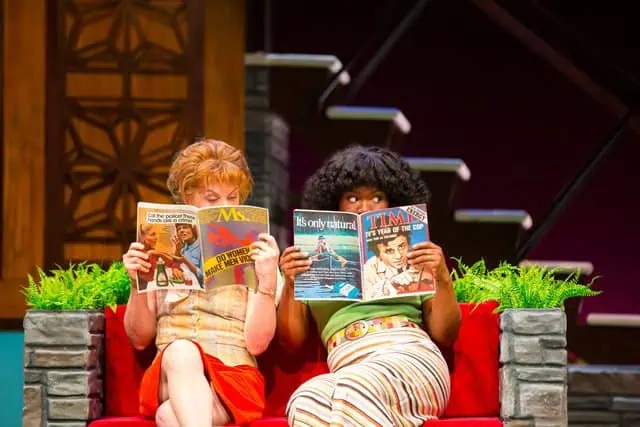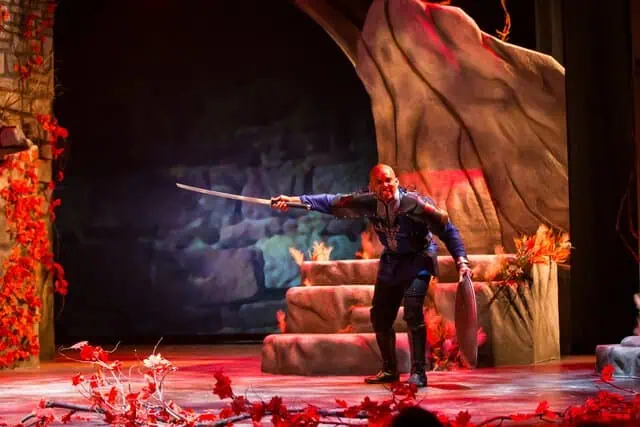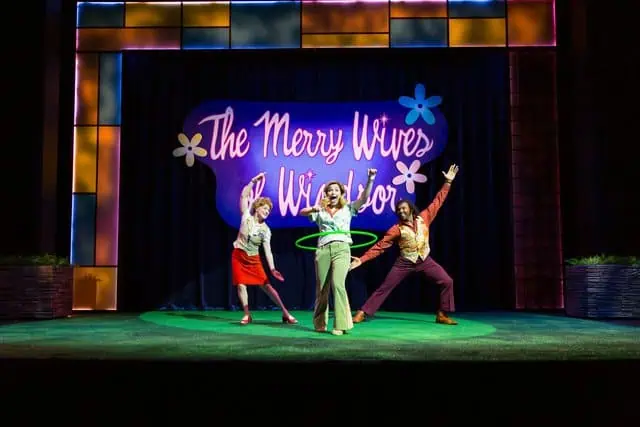
Things look a little different at the Colorado Shakespeare Festival this year. Known for its enchanting outdoor performances, the annual celebration of the Bard has moved from the Mary Rippon Theatre to the newly renovated Roe Green Theatre for the 2024 and 2025 seasons.
The reason? A massive, long-overdue renovation of the Hellems Arts and Sciences building, whose grounds include the Mary Rippon. Construction began in summer 2023 and is expected to last until 2026. The festival anticipates resuming its five-show season in the two theaters once the facility reopens.
The project will regrade pathways and increase accessibility by installing new ramps, handrails and lighting elements. It will also include scenic patios with overhead lighting and a cafe, according to CSF’s producing artistic director Tim Orr. The Mary Rippon stage will remain unchanged, preserving the beloved open-air experience that has captivated audiences for more than 60 seasons.
This year, the Colorado Shakespeare Festival offers two mainstage productions: Macbeth and The Merry Wives of Windsor. Together these works make an uneven pair, coupling a bold new interpretation with a high-concept but underwhelming production.
Dark descent
Wendy Franz‘s reimagining of Macbeth challenges traditional interpretations of the frequently staged tragedy, exploring the psychological torment of a Scottish nobleman driven to regicide by ambition and paranoia.
Her direction transforms the Weïrd Sisters from witches to humans, bringing the play into a more real-world context. This approach is anchored by the performances of Noelia Antweiler, Ilana DeAngelo and Devi Reisenfeld, who play the sisters with a realism that adds an unsettling edge to their power.
Franz’s approach to the characters Macbeth and Lady Macbeth is another significant departure from the usual interpretations. Instead of starting the play in a tragic atmosphere, both characters are portrayed with good intentions and naive ambitions. Macbeth (Lavour Addison) begins as a noble warrior with a strong sense of honor and duty, making his gradual transformation into a tyrant all the more dramatic.
Lady Macbeth (Shunté Lofton) initially demonstrates a more human touch, showing genuine love and partnership with her husband. While Addison’s performance is compelling throughout, Lofton struggles to convey the full extent of Lady Macbeth’s manipulative tendencies, especially as she becomes increasingly paranoid in the second act.
The production’s design elements elevate the experience. Scenic designer Matthew S. Crane creates a multi-level castle adorned with auburn leaves and ominous branches, while Garrett Thompson’s projections add subtle atmospheric changes. Meghan Anderson Doyle’s costumes blend traditional Scottish attire with modern, almost fantastical elements, evoking a unique visual style reminiscent of Mortal Kombat.
Despite some uneven supporting performances, the production maintains a compelling pace for just over two hours. Key performances by Sean Scrutchins as Macduff and Sam Sandoe as Duncan add gravitas to this dark story, making Franz’s Macbeth a fresh, accessible interpretation for both new and seasoned Shakespeare fans.

Style over substance
Director Kevin Rich’s decision to frame The Merry Wives of Windsor in the style of a 1970s sitcom sets high expectations. With its colorful set and neon cursive title sign, the concept aims to draw parallels between TV shows like All in the Family and Shakespeare’s middle-class comedy about Sir John Falstaff’s attempts to woo two married women to steal their husbands’ fortunes. However, the execution feels forced and disjointed.
The production design, with its ’70s-inspired set by Matthew S. Crane and vibrant costumes by Sarah Zinn, is visually appealing but fails to serve the narrative. The overreliance on sitcom tropes and gags, such as an overzealous announcer and sporadic laugh track, detracts from the story rather than adding to it. Other anachronistic elements, like a hula hoop sequence and inconsistent East Coast accents, add little to an already bloated script.
Jacob Dresch‘s performance as Falstaff suffers from excessive improvisation and exaggerated gestures, making it difficult to connect with his character. Because the performances are mostly caricatures, the play’s stakes are reduced with little room for genuine comedic timing. The only actor who rises above the overly produced shenanigans is Sean Scrutchins as Frank Ford, portraying a man who believes he’s being cuckolded to great comic effect.
Overall, Merry Wives struggles to balance its innovative concept with effective storytelling. While the design elements are commendable, they ultimately fail to rescue the play from its lackluster execution.

ON STAGE: Macbeth and The Merry Wives of Windsor at the Colorado Shakespeare Festival. Through Sunday, Aug. 11, Roe Green Theatre, University Theatre Building, Pleasant St., Boulder. $30+
